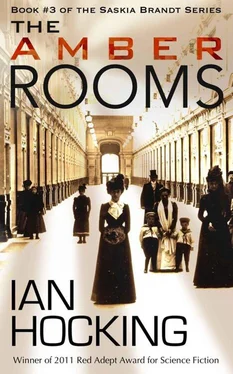The gendarme said, ‘Be quiet. Let’s see what happens.’
‘Do you wonder why a good fellow such as yourself should be killed so a person like me can go free? After all, you’re a good citizen. But there can be no good citizens in a corrupt society, comrade.’
‘I told you to shut up.’
‘I’ll ask my friends for leniency, assuming you’ll cooperate. What will you say if you are later presented with my face? Let’s practise.’
With a sudden jerk, the wagon’s speed increased. The gendarme collapsed into his seat and let his head fall into his grey-gloved hands. Whether this was a childish mime in answer to Kamo’s question, or simple despair, Kamo could not be sure.
Kamo strained to look through the window but the angle was too oblique. Street lamps passed in haste. He pictured the horses. He had a bad feeling. All of St Petersburg was being treated to a display of his botched escape. But, before that, the carriage would strike an errant bump, or attempt a corner, and a spill would be the result.
Then, in the next moment, the wagon flipped forward.
Kamo wondered if he were already dead. Perhaps the carriage had crashed minutes (centuries?) before and this experience was only an echo of his last moment, sounding again and again. But the gendarme was gripping his seat and asking for his mother to save him, and it became known to Kamo with a troubling certainty that the wagon had been ridden into the River Neva. Kamo had an image of the horses going over the bank; their drop would explain the sharp leverage needed to make the wagon flip.
The carriage struck the water with a tremendous crash. Kamo, facing backwards, was in a good position to meet the impact, but the gendarme was thrown forward. He managed to twist before striking the partition behind Kamo, however, and this saved his neck. As the carriage righted, he fell into the well between the seats, dazed.
Kamo felt water close on his hands. It was rising fast through the suspension holes. Soon it rushed across the floor, biting his wounded feet with cold. Then silver dribbles came through the cracks in the doorframe. The carriage tipped sideways and Kamo roared as his wrists accepted the weight of his body. Barrels of white, icy water burst upwards through the window. Kamo watched it swallow the gendarme. Then the water passed his head, blocking his eyes and pressing the air from his lungs as the carriage drifted down.
A hand gripped his ankle. The gendarme, then, was thrashing his last. Kamo kicked him. But a unexpected sensation spread from his wrists: release. The gendarme had freed him.
With a thump, the carriage settled on the river bed.
Kamo floated upwards. His face emerged into a pocket of air that shrank to nothing as he took a breath. He twisted left and right. He felt certain that his rescue had failed, that he would die here with the gendarme. However, he would not panic at the foot of the tower of Death. He would kick open the door of the carriage. Make the lazy tyrant come down to Kamo.
An elbow hooked his neck and he was drawn away from the bench. There was a perceptible change in the water around him. He was, now, outside the shell of the coach. He was in the river proper. The arm released him and Kamo kicked. He kicked at the darkness and rose through the black skins of filth until he roared onto the surface. Out of the silence, sounds returned: moving water, distant shouts, cheers, and clip-clop of traffic. The wild eye of a horse bore down, and Kamo had time to cover his head as its flank spun him aside. Only when the thrashing animal had passed did he think of riding it from the river.
The horse had deadened his shoulder. He moaned, went under, and when he emerged a second time, he saw a lantern blinking in the darkness as its cowl was raised and lowered. Kamo swallowed water. His shoes gave little to his flailing legs and his arms were loaded with iron manacles. Yet he thrashed towards the blinking lodestone and swore at the river and damned his burning muscles.
The lantern was extinguished moments before Kamo could reach for it. Arms took him from the darkness and hauled him across the stern of a small launch. Kamo collapsed with his head against the gunwale. Next him was a figure so wrapped in a blanket that only his red nose was visible. It was the gendarme. A second, red-haired man unshipped the oars of the launch and dug them into the black river. A third figure put a blanket around Kamo’s shoulders, who was too exhausted to raise his head. Instead, he lay looking at his manacles. How had he swum with these things? The calls and heckles of the shore grew dim as the launch pushed into the open estuary. The oarsman’s breaths grew fuller.
Kamo turned to the person at the tiller. He noted the small rubberised slippers, the canvas trousers tied with thong at the ankle and the knee—a familiar style—and the boat cloak. He looked closely at the eye slits in the tiller’s mask, which was better suited to the masked ball than a rescue. The hair that rolled like a black flag in the wind, abeam the boat, off the Gulf of Finland.
His eyes shrank.
‘Ahoy, comrade,’ Lynx said.
‘Why?’ he spat.
‘I need you to make me—us—invisible.’
His head thickened with icy thoughts of her demise, until the cold reached his centre, and he slowed, asleep.
Robespierre had found them rooms above an orthopaedic clinic. The rooms belonged to the surgeon of the clinic, but as he had bought a house some streets away, the apartment was officially unoccupied. The doctor’s son, a medical student, had taken the key to it, telling the concierge he would use the place to study for his exams. That key had found its way, during a meeting of the debating society, to the watch pocket of Robespierre’s only waistcoat. Now, Saskia had the key. She liked the apartment for two reasons. First, callers were required to pass through the rooms of Madame Zaslavsky, the sister of the doctor, who discouraged visitors. Second, there were no servants.
It was midnight when Saskia finished her exercises with the wooden man, an oriental training aid that the surgeon had commissioned from a drawing. She trained wearing a silk kimono with the belt tied at the front. It was the closest she could find to gym apparel. The head of the wooden man should have been bound by rope. It was not; it made a hollow sound when she punched it.
Robespierre knocked.
Saskia walked to the mirror and checked that the kimono was closed and tight.
‘Enter.’
Robespierre’s coat swung heavy with food. He took bread from his left pocket and ham from his right. Silently, Saskia lit the oil in the samovar and cleared away her books from the carpet in the centre of the room. She reached for a towel and patted her forehead while Robespierre arranged their picnic.
He nodded at the wooden man. ‘Why do you keep doing that?’
‘Precision. Stability. Speed. Power.’
‘Come and eat. It’s the other side of the coin.’
Saskia attended the spirit lamp. ‘Tea?’
‘Strong.’
‘It would take a particularly incompetent government agent to mistake your bulges for a pregnancy.’
‘He certainly wouldn’t mistake them for food. This ham is a week gone.’
Robespierre caught the delight in Saskia’s eyes, and they both chuckled.
~
They lay opposite one another, their directions reversed. Saskia had her eyes closed. A fire burned in the hearth.
Robespierre said, ‘Shall I take some food to him?’
‘He can eat tomorrow. I want him hungry.’
‘He’s dangerous.’
Saskia practised untying and tying her belt of her kimono. ‘You don’t need to tell me how dangerous he is. I’ve seen him.’
‘I hope you can control him, whatever your plan is.’
Читать дальше












